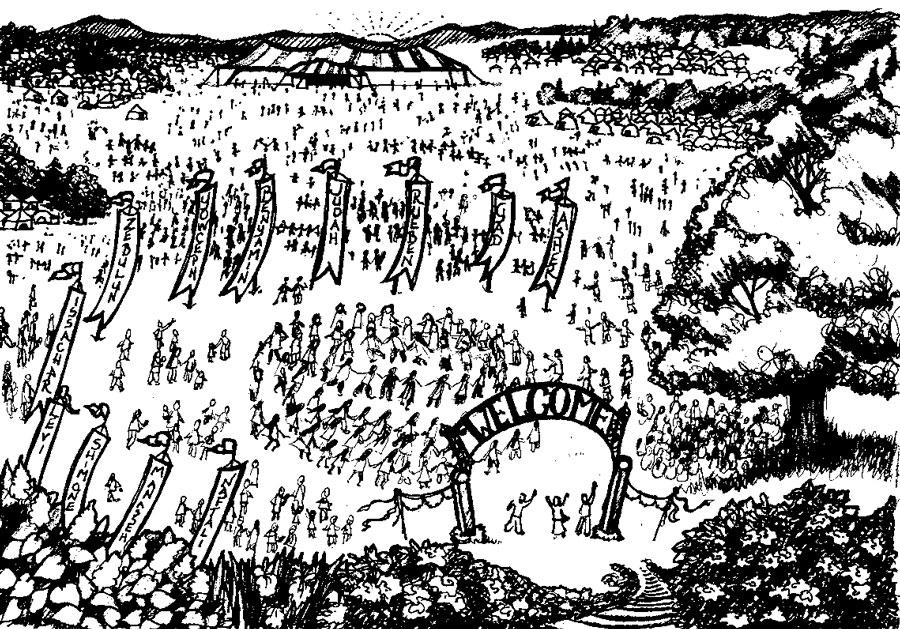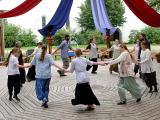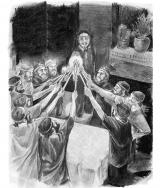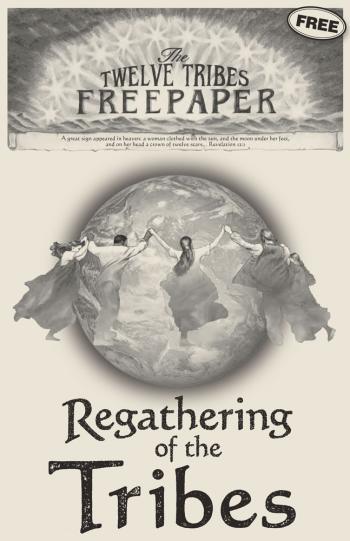Tribes in the New Covenant
Feb 24, 2021
And now I am standing trial for the hope of the promise made by God to our fathers, the promise to which our twelve tribes hope to attain [for them], as they earnestly serve God night and day. And for this hope, O King, I am being accused by Jews. (Acts 26:6-7)
When Paul, in his defense before Agrippa, referred to "our twelve tribes," there were no twelve tribes as there had been in the Old Covenant times. There were only two identifiable tribes left who returned from the captivity ? Benjamin and Judah. Most took their identity in Judah, from which we get the word "Jew", meaning one belonging to the tribe of Judah. Surely he was not referring to the Jews who were accusing him. Paul would never have said that the Jews of his day were earnestly serving God. His letters show that he thought quite the contrary, even though he loved his fellow countrymen.
So who were these twelve tribes? Who were these people earnestly serving God night and day?
Paul’s letters were always to those who believed in the Messiah and had obeyed the gospel, and to the Ephesians he wrote:
You were at that time separate from Christ, excluded from the common-wealth of Israel, and strangers to the covenants of promise, having no hope and without God in the world. But now in Christ Jesus you who formerly were far off have been brought near by the blood of Christ ... So then, you are no longer strangers and aliens, but you are fellow citizens with the saints, and are of God’s household, having been built upon the foundation of the apostles and prophets? (Ephesians 2:12-13,19-20)
He labored to communicate that at one time they were considered Gentiles, uncircumcised, separate from Messiah, excluded from the commonwealth of Israel, strangers to the covenants of promise. He equated being outside of Messiah with being outside of Israel.
In verse 13 the "BUT" indicates a change, something to the contrary. He makes it clear that, by the blood of Messiah, all those aforementioned negative things are no longer true for those who are in Messiah. Being in Messiah is being in Israel, no longer strangers and aliens, but now fellow citizens in God’s household. Ephesians 1:3-14 puts much emphasis on the matter of being in Messiah.
God didn’t start something new with the Gentiles. He grafted them into what was already there ? the root, the same root that Israel was part of. That root only produces Israel.
The Jews will be made jealous by those who will be the nation they were supposed to be. 1 God wanted them to be a priesthood ? a royal priesthood, and a holy nation. 2 When Israel failed as a nation to enter into the priesthood, God was left with only one tribe of priests. This was never the desire of His heart, and He was not satisfied with that. He has an eternal purpose, and it will be accomplished. He wants a whole nation of priests. He wants a nation that will produce the fruit of the Kingdom.
Israel failed as a nation in the time of Moses, and they failed as a nation in the time of the Messiah. 3
To what nation is He going to give the Kingdom?
To the nation that produces the fruit of it. This is the holy nation of 1 Peter 2:9 ? the spiritual Israel, manifested in twelve visible tribes.
That is why the Jews will be jealous. There will be a nation producing the fruit of the Kingdom, which they themselves should have produced, but didn’t. That nation will be the light to the nations because of the fruit produced. 4 That nation must express its life in twelve geographical locations, with tribes and clans all over the world, so that His Salvation can reach to the ends of the earth. 5
Today, in Messiah, there is a royal priesthood spoken of in 1 Peter 2:9-10 ? the same royal priesthood that God wanted in Exodus 19:5-6. But how can you be a nation, a holy nation, unless there is a national identity and culture that makes you distinct from all other nations?
Isaiah 49:6 speaks of the twelve tribes being a light to the nations until His Salvation reaches to the ends of the earth. Has God’s Salvation reached to the ends of the earth? It must be done in this age in order for Messiah to return. 6 That light will be a visible demonstration, a life lived before men in such a way that there will be no excuse for not obeying the word of God, and for not obeying one’s conscience.
The life is the light of men. The twelve tribes will be a light to the nations, and it is the life of Messiah that they live together in unity that will be that light. 7 That is why the judgment of John 3:19-21 will be righteous judgment, because the evidence will be so clear. This is the Bride of Messiah as the angel told John in Revelation 21:9-27. He showed him a city with the name of the twelve tribes on its gates. The bride? the city? the names of the twelve tribes... the woman with the crown of twelve stars. 8 They all speak of the same entity ? the Body of Messiah.
If you read John 3:19-21 each time you read the word, light, try substituting the phrase "life together in complete unity." It will give you a clearer picture of how practical God is. Men will not be judged for something they don’t understand. There will be absolute clarity.
That’s what Messiah meant when He said that the end won’t come until the Gospel is preached as a witness to all nations in the whole world. 9
A witness is not just a verbal declaration, as so many have rendered the meaning of the word. A witness is a clear testimony backed up by visible evidence. There has to be a light that one sees. Light is not heard, but seen. Its presence has to cast out darkness. 10
What more powerful, visible witness can there be than the life of a nation being lived out in complete unity for all to see? That is the life of the twelve tribes as described in Acts 2:37-47; 4:32-37. It is the very realization of Deuteronomy 15:4, being done by the strength that He supplies, through His Spirit. 11
This is the foundation and pattern of the Church. This is what the true Gospel produces. The life that the gospel produces must be lived in every place where God is establishing His name.
The Church described in Ephesians 1:22-23 will find its identity in being Israel. Israel is manifested only in twelve distinct tribes. Those twelve tribes will be a light to the nations. The Body of God in the Spirit is built in unity. 12 It is only there that He will dwell among men. This is His Body. 13 He dwells in His Body, and His Body dwells among men.
He cannot and will not dwell in disunity. Some have dared to agree to disagree. They have willfully chosen to go against the very heart of the Messiah and of the Holy Spirit as expressed in John 17:20-23, and in 1 Corinthians 1:10. Can one honestly say that this is the fruit of the Kingdom?
[For more on this subject, see Why Twelve Tribes]



